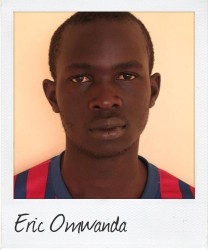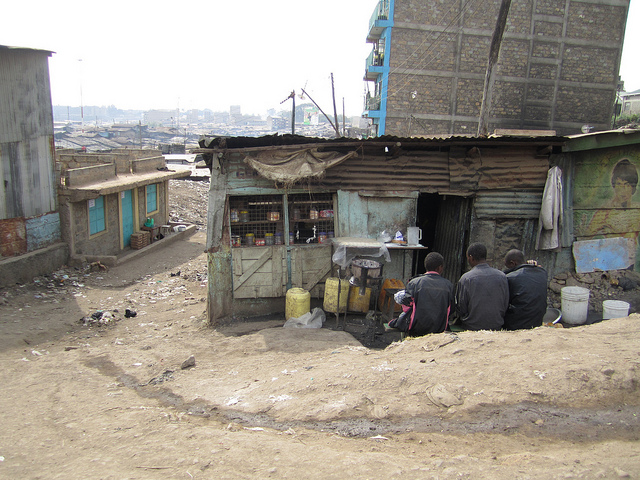"Combating injustice through tolerance and honesty"
November 17 The majority of people live under policies made by a minority, writes Eric Omwanda, 23, a Commonwealth Correspondent from Nairobi in Kenya, who says the injustices that can result must be remedied.
The majority of people live under policies made by a minority, writes Eric Omwanda, 23, a Commonwealth Correspondent from Nairobi in Kenya, who says the injustices that can result must be remedied.
Today as I walk down the streets of Mathare slums, I am touring part of my beloved country. I know that I should never be judged by the colour of my skin or my tribal affiliation rather by my behaviours. The streets that I am used to are most of the time busy and noisy, especially during the day. But since we are living in a world with different people, on Sunday’s morning the streets are as silent as a grave.
The slums are a true reflection of the life of either an average Kenyan or a Kenyan who lives below the poverty index. Honestly speaking, some of the world’s challenges are created by the “chosen” few elites. These elites will spend most of the work time deliberating on setting policies that govern other ordinary people in the planet. Without any bigotry or malice, we have to acknowledge that they contribute in some way to bring about world peace.
On a different tone, these influential individuals play a vital role in promoting the culture of social, economical and political injustices in the world. Since time immemorial, laws that were enacted by leaders like Pontius Pilate, King Herod, Idi Amin or the United States of America Pentagon were based on safeguarding the interests of the selected few elites. Today even in a new state like South Sudan, which was born four years ago, the leaders will enact laws that promote their interests and those of their close allies. In Tanzania they practiced socialism where both the rich and the poor use resources equally. Even so, there are citizens who cannot afford basic needs regularly.
For instance, back home in Kenya we have embarked on a new system of governance, where there are 47 County governments and a Nation government. The primary reason is to bring resources closer to the citizens of this beloved nation. Will these fix the injustices that have crippled the economy and the social fabric in the country? Without any doubt this will not fix the injustices that exist.
In countries where they have booming economies like Sweden and Norway, they did their homework and noticed that corruption in the public and private sector is one of the key elements that bring inequality among their people. The two nations have fought corruption indefatigably, and currently are ranked among the top countries with minimum cases of corruption.
It is also time that the laws that are set by the elected few be debated upon by the public domain through community or public forums that allow public participation. Last week in Burkina Faso, the citizens burnt down the country’s Parliament since the President (who later resigned) wanted to stay in power for one more year. He has been in power for 27 years and he was arguing that he wanted to be the President during a transitional government for one year. The people of Burkinabe rejected his decision and went on show that the sovereign power belongs to them.
In my opinion, we have to be very tolerant with our leadership as citizens, so that we don’t damage our legal structures or country’s property. To leaders, staying in power for long periods usually worsens your reputation, so it is advisable to throw in the towel when you have served for too long. After all, we can only lead for a specific duration.
It is the right time to embrace one another, to put structures that will allow people to live peacefully in a just world. Now is the moment of redefining ourselves and allowing the human characteristics of tolerance, humility, patience, and honesty among others to manifest to other people. This is important especially for purposes of nurturing the next generation to come. They have to learn from this generation.
A world free of inequality – that is my world vision. Come on everyone, we embrace it together.
photo credit: The Advocacy Project via photopin cc
…………………………………………………………………………………………………
About me: I am aspiring to be world class journalist who will share stories beyond my community and country because stories happen beyond set boundaries and they need to be told.
My interests are issues affecting humanity either positively or negatively, taking photos and videos. You may kindly visit http://matharefoundation.blogspot.com
Currently I am a freelance journalist based in Nairobi. I do commercial video production and photography when hired by clients.
…………………………………………………………………………………………………
Opinions expressed in this article are those of the author and do not necessarily represent the views of the Commonwealth Youth Programme. Articles are published in a spirit of dialogue, respect and understanding. If you disagree, why not submit a response?
To learn more about becoming a Commonwealth Correspondent please visit:
http://www.yourcommonwealth.org/submit-articles/commonwealthcorrespondents/
…………………………………………………………………………………………………




